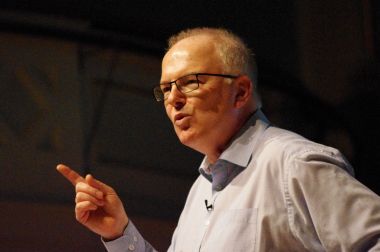Sports theology: why Match of the Day is a religious experience
Sport can be a substitute for religion – and they have a lot in common, says an Oxford theologian.

Speaking at the BMS Catalyst Live event in Reading, Rev Dr Rob Ellis, principal of Regent's Park College, said the "huge rise" in the number of people wanting to watch sport paralled a decline in the number of people attending church.
"As organised religion lost its grip on people's imaginations, other things began to flow into the void, including sport," he said.
The process began as early as the 19th century. Churches and church organisations like the YMCA sought to capitalise on the growing interest after initially resisting it.
Ellis had conducted a survey of 500 participants and spectators in which he sought to draw out what they felt about sport and why it was important to them.
"Many spoke of sport as the central fact of their lives," he said. "It helped them create and express their identity. It formed their character. There was a connection between sport and beauty, or awe. And it provided a rhythm for their lives with echoes of the liturgical calendar."
He added that while for spectators winning was everything, players had a different perspective: there was "something beyond the win", though it might not be articulated.
He drew connections between sport and religion, saying: "Competitive sport involves the desire to be the best we can be. The Olympic motto – "Higher, stronger, faster" – encapsulates a desire for transcendence. A human person is someone who is always reaching beyond themselves.
"We are dynamic creatures of potential. Sport always involves a striving, reaching upward and outward to something always beyond the penultimate in our experience. We are seeking an elusive moment of perfection, looking always to go beyond. The best moment always lies ahead."
The spectators who responded to his survey spoke of the way in which their sport bonded them with others. Some spoke of "feeling most fully alive" as they watched. They would encourage others to come and share their experience. "The singers on the Kop may not be worshippers, but they are certainly taking part in some way," Ellis said, arguing that "sports fans who can't themselves hit a six achieve it vicariously" through the players.
He concluded by quoting footballer Thierry Henry, who said of watching Match of the Day: "It's like going to church, you know. It's a religious thing."











